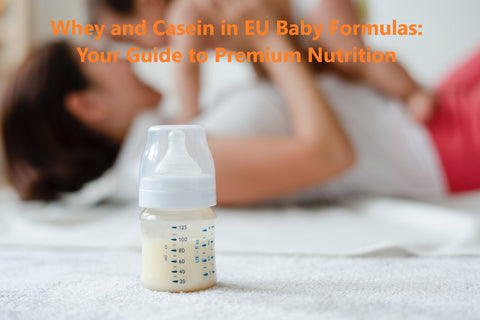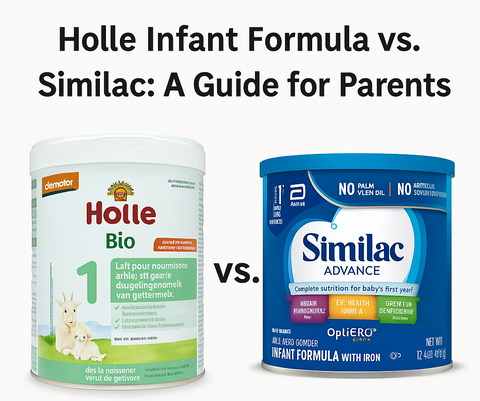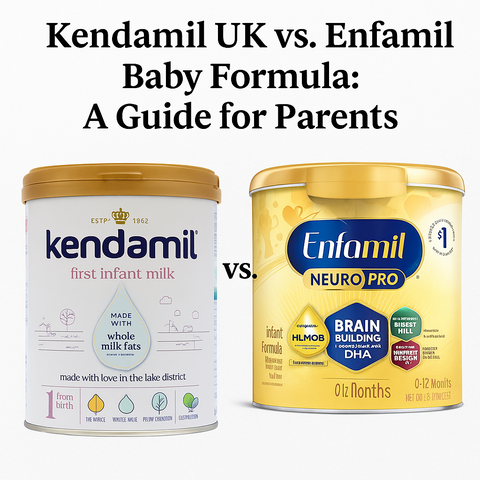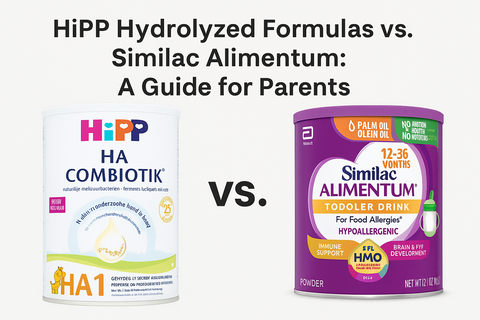European Dairy and Soy-Free Formula: A Nutrient-Packed Solution for Your Little One
Parenthood is a journey filled with choices, and one of the most crucial decisions you'll make as a parent revolves around your baby's nutrition. For some infants, dietary restrictions or allergies make this choice more complex. You're in the right place if your little one requires a dairy and soy-free formula. In this article, we'll walk you through what to look for in non-dairy or soy-free formulas and introduce you to options like Bebe M Organic vegan formula. This 100% plant-based, non-dairy formula is soy-free and EU-organic certified. So, let's embark on this journey to find the best organic formula for your little one and dive into the reasons behind the surge in demand for soy and dairy-free formulas.
Why Opt for Dairy or Soy-Free Formula?
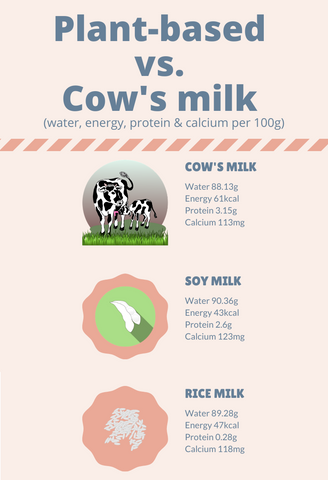
When choosing a baby formula, many parents consider alternative formulas beyond the Organic European cow's milk formula or goat's milk formula. The infant formula market is expanding, and one of the main reasons is that European formula brands are developing new recipes to address allergies and intolerances, such as cow's milk protein allergy (CMPA) and lactose intolerance. Before we dive into the specifics, let's understand why some babies might need dairy and soy-free formula:
- Allergies: Some infants develop allergies or sensitivities to proteins found in cow's milk (casein and whey) and soy products. Cow's Milk Protein Allergy (CMPA) and soy allergies in babies are both food allergies that can manifest early in life. These two allergies can be related in some cases due to cross-reactivity. Cross-reactivity is when the proteins in one substance (like cow milk) are similar enough to those in another substance (like soy milk) that the body can't tell the difference and reacts to both. Not all babies with cow's milk allergy will also have a soy allergy because every baby's immune system is different. Some are more "vigilant" than others and will react to more things. Some might only react to cow's milk, while others may react to both cow's milk and soy. In cases where a baby shows signs of an allergy to cow's milk and soy, they may be given special hypoallergenic formulas instead. However, a plant-based formula without dairy or soy can also be a solution!
- Lactose Intolerance: Lactose intolerance is another common reason. Lactose intolerance is when your body can't fully digest lactose, a sugar found in milk and dairy products. Your body needs lactase enzyme to break down this sugar, but some people don't make enough of it. Lactose intolerance is rare in infants but can occur. Lactose-free formulas are designed to provide adequate nutrition while supporting the digestive needs of lactose-intolerant infants!
- Sensitivity & Special Dietary Needs: Some babies may be sensitive to cow's milk or soy-based formulas without a full-blown allergy or intolerance. Soy and dairy-free formula is beneficial for addressing allergies and caters to special dietary needs, including vegan lifestyles. While a well-planned vegan diet can meet the nutritional needs of adults and older children, more is needed for infants due to their high nutritional demands. Nutrients like protein, Vitamin B12 & D, iron, zinc, Omega-3 fatty acids, and calcium, critical for growth and development, may be lacking or not easily absorbed from plant sources. Always consult a pediatrician before implementing vegan and vegetarian diets for infants!
Decoding CMPA, Lactose Intolerance, and Soy Allergies in Babies
Understanding infant health is crucial for parents. Now, let's delve deeper into and give you more insights about Cow's Milk Protein Allergy, Lactose Intolerance, and Soy Allergies in Babies. Here are some common issues:
Cow's Milk Protein Allergy (CMPA):
CMPA is an allergic reaction to the proteins found in cow's milk, particularly casein and whey. Symptoms may include:
- Colic
- Eczema
- Diarrhea
- Respiratory problems.
Hypoallergenic formulas, free from cow's milk proteins, are the go-to solution for CMPA. 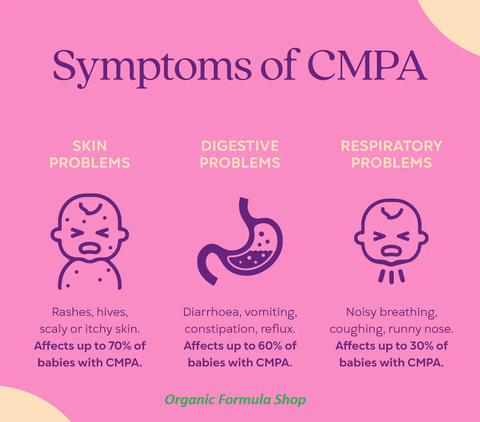
When a baby experiences CMPA, their body can exhibit two primary types of reactions. The first response occurs rapidly, typically within an hour of milk consumption, and is often triggered by an IgE immune component, which plays a crucial role in the baby's defense against harmful agents. This reaction is relatively more noticeable since it leads to typical allergy symptoms like skin rashes or respiratory difficulties and can be confirmed through a blood test. The second reaction unfolds slower and may not become evident until several hours or even days after milk ingestion. Unlike the first type, this slower-onset reaction is not driven by IgE, making it somewhat challenging to identify and diagnose. Its symptoms, such as gastrointestinal discomfort or skin conditions like eczema, may not immediately appear allergy-related.
Lactose Intolerance:
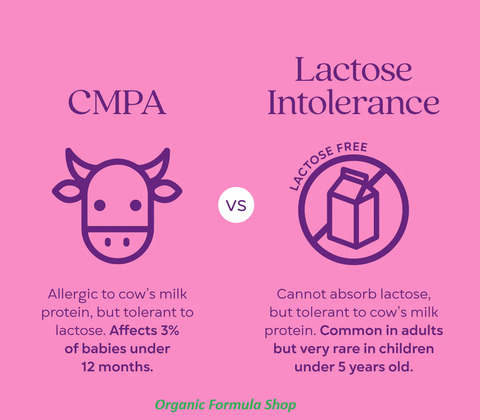
There are two types of lactose intolerance. The first is a genetic condition where infants are born with low or no lactase production. The second one is temporary and can be caused by underlying conditions like gastrointestinal infections or intestinal injuries. Lactose intolerance occurs when a baby's digestive system lacks the enzyme to digest lactose. This can lead to gas, bloating, and diarrhea. Lactose-free formulas, whether dairy or soy-based, are good alternatives.
Milk allergy and intolerance often get confused, as they manifest distinct characteristics. In contrast to milk allergy, which triggers an immune system response, milk intolerance does not involve an immune reaction. Another differentiation between lactose intolerance and food allergies lies in the timing of symptoms. Lactose intolerance typically leads to delayed symptoms, whereas allergies can induce immediate reactions, delayed responses, or a combination of both.
Soy Allergy:
Soy allergy is an immune response to proteins in soy products. Symptoms may include skin rashes, digestive issues, and respiratory discomfort. For babies with soy allergies, soy-free hypoallergenic formulas are recommended. If you suspect your baby may have one of the allergies above or intolerances, it is recommended to consult with a healthcare professional for an accurate assessment and appropriate guidance.
Exploring Dairy and Soy-Free Organic Formula Choices
When searching for dairy and soy-free formula options, you'll discover several types:
Partly Hydrolyzed Formulas
- Protein Source: Extensively hydrolyzed formulas are derived from cow's milk, similar to regular infant formulas. However, the key difference is that the proteins in extensively hydrolyzed formulas have undergone significant processing to break them down into smaller peptides or fragments.
- Protein Size: In extensively hydrolyzed formulas, the proteins are broken down into smaller peptides, which are less allergenic than whole proteins. These smaller peptides are still large enough to provide some nutritional benefit but are less likely to trigger allergic reactions in infants with CMPA.
- Lactose Content: Extensively hydrolyzed formulas are typically lactose-free or have a low lactose content. This makes these formulas suitable for infants sensitive to lactose or lactose intolerance.
Plant-Based Rice Formulas
Rice formulas, like Bebe M, ensure infants receive the necessary nutrients for growth and development. This formula offers a plant-based alternative to traditional cow's milk or soy-based formulas, making it suitable for babies with dietary restrictions or allergies. It's important to note that the Bebe M formulas are classified as "foods for special medical purposes" (FSMP). These are specialized infant formulas designed to meet the nutritional needs of infants with food allergies, sensitivities, or intolerances, particularly cow's milk protein and soy. What are the specifics of these formulas? Let's take a closer look:
- Protein Source: The primary source of protein in plant-based rice formula is rice protein. This naturally hypoallergenic plant-based protein is less likely to trigger allergic reactions than cow's milk or soy proteins. Additionally, the rice protein used in these formulas is typically hydrolyzed, which means it has undergone enzymatic processing to break it down into smaller, more easily digestible fragments. This hydrolyzation process further reduces the risk of allergic reactions.
- Allergen-Free: One of the key advantages of hydrolyzed plant-based rice formula is that it is allergen-free. It does not contain allergens like cow's milk protein, soy, or lactose. This makes it suitable for infants with a range of allergies, including cow's milk protein allergy (CMPA) and soy allergies, as well as those with lactose intolerance.
- Easy Digestibility: This formula's hydrolyzation of rice protein makes it easily digestible for infants. The enzymatic breakdown of protein into smaller fragments helps minimize digestive discomfort and reduces the likelihood of gastrointestinal issues often associated with food allergies or sensitivities.
- Nutritional Content: To ensure that infants receive adequate nutrition for their growth and development, hydrolyzed plant-based rice formulas classified as FSMP are fortified with essential nutrients. This typically includes vitamins, minerals, and other key nutrients like iron, calcium, and omega-3 fatty acids. The goal is to provide a well-rounded diet that supports healthy growth while catering to dietary restrictions.
- Suitable for Vegan or Plant-Based Diets: Hydrolyzed plant-based rice formulas align with vegan and plant-based dietary preferences. It offers an alternative to animal-based protein sources, making it a suitable choice for families who wish to raise their infants on a vegan or plant-based diet.
- Medical Supervision: It's important to note again that Bebe-M's plant-based rice formula is classified as FSMP. Please consult your pediatrician before introducing the formula to your baby.
Amino Acid-Based Formulas
Amino acid-based formula is a non-dairy formula. These formulas have undergone significant processing; hence the reason we do not support or offer these formulas in our Webshop.
Safety Considerations with Soy-Based Infant Formula
Soy-based formulas have been the subject of discussions and debates regarding their potential impact on health, mainly when consumed by infants. Some of the key considerations include:
- Allergic Reactions: Infants with multiple food allergies, including cow's milk and soy, are relatively common. While soy-based formulas can be an alternative, some infants may still experience allergic reactions to soy isoflavones or proteins.
- Hormonal Effects: Soy isoflavones bear a structural resemblance to estrogen, allowing them to interact with estrogen receptors in the body. This has sparked concerns about potential hormonal effects, especially in infants whose endocrine systems are still in the developmental stages.
- Thyroid Function: Some evidence suggests that high soy isoflavone consumption may potentially influence thyroid function, especially in individuals with preexisting thyroid conditions. However, the exact impact on healthy infants consuming soy-based formula remains a topic of ongoing scientific discussion.
It's important to note that despite these concerns, The American Academy of Pediatrics (AAP) deems soy-based formulas as an acceptable option for infants, specifically for those with cow's milk allergies or lactose intolerance. Nevertheless, they emphasize the need to closely monitor infants exclusively fed soy-based formulas to ensure proper growth and development.
Why Opt for Bébé M Organic Rice Anti-Reflux Baby Formula?
This formula, available through Organic Formula Shop, offers several unique advantages for babies with specific dietary needs. Bébé M has developed an Organic Rice Anti-Reflux Formula to alleviate reflux symptoms while remaining dairy and soy-free. Since 2013, Bebe M has offered a range of organic infant formula in powder form that caters to diverse dietary needs, excluding milk, soy, palm oil, and gluten. Here's why Bébé M Organic Rice Anti-Reflux Baby Formula is worth considering:
- Gentle on Sensitive Tummies: This formula is formulated to be gentle on your baby's digestive system. It's crafted to reduce the occurrence of reflux, providing relief for both you and your baby.
- Organic Ingredients: Bébé M prioritizes using organic ingredients, ensuring your baby's formula is free from synthetic pesticides and additives. This commitment to organic sourcing aligns with the values of many health-conscious parents.
- Sustainability: Bebe M not only prioritizes the health of babies but also strives to be a sustainable company that addresses social, economic, societal, and environmental concerns. We love that!
- Nutrient-Rich: While addressing reflux, Bébé M's formula doesn't compromise on nutrition. It delivers essential vitamins, minerals, and macronutrients for your baby's healthy growth and development.
- Availability at Organic Formula Shop: You can conveniently find Bébé M Organic Rice Anti-Reflux Baby Formula at Organic Formula Shop, a reputable source for premium organic formulas. Organic Formula Shop offers a range of carefully curated organic formula brands, making it a trusted destination for parents seeking the best for their babies.
Bebe M organic formula is available in three different stages designed to meet the specific nutritional needs of infants at different developmental milestones:
Bébé M Organic Rice Anti-Reflux (AR) - Stage 1
For infants aged 0-6 months.
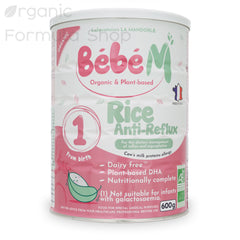
Bébé M Organic Rice Anti-Reflux (AR) - Stage 2
Suitable for infants aged 6 months and older.
Bébé M Organic Rice Anti-Reflux (AR) - Stage 3
Developed for infants aged ten months and older.
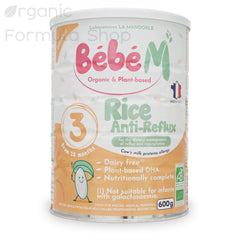
Selecting the Ideal Formula for Your Baby
In your journey to find the best dairy and soy-free formula for your baby, remember that each baby is unique. What works best for one may not be suitable for another. Consult with your pediatrician, explore reputable brands like Bébé M, and consider the convenience of Organic Formula Shop in your quest to provide the ideal nutrition for your baby's healthy development. We have free express (3-5 business days) shipping on all orders anywhere in the U.S.
Check our baby formula comparison chart to help you understand the differences between our offered formulas.
Conclusion
In conclusion, the quest for the best dairy and soy-free formula is a journey filled with consideration and care. With a clear understanding of your baby's dietary needs, potential allergies, and sensitivities, you can make informed choices. Whether you opt for extensively hydrolyzed formulas or plant-based alternatives, the right formula can provide the relief and nourishment your baby needs. Consult with your pediatrician, explore reputable brands like Bébé M Organic Vegan Formula, and prioritize your baby's well-being. Your dedication to their health and happiness is the foundation of a strong and loving parent-child bond!
Contact
Contact our dedicated customer support team for expert advice and guidance tailored to your baby's needs. They have earned hundreds of 5-star reviews from our customers, helping you to provide the best nutrition for your little one. Contact us here or shoot us an email at support@organicformulashop.com. We're here to help!
Happy Feeding!
Disclaimer: This Article is not medical advice. Always consult your healthcare provider for personalized guidance.

